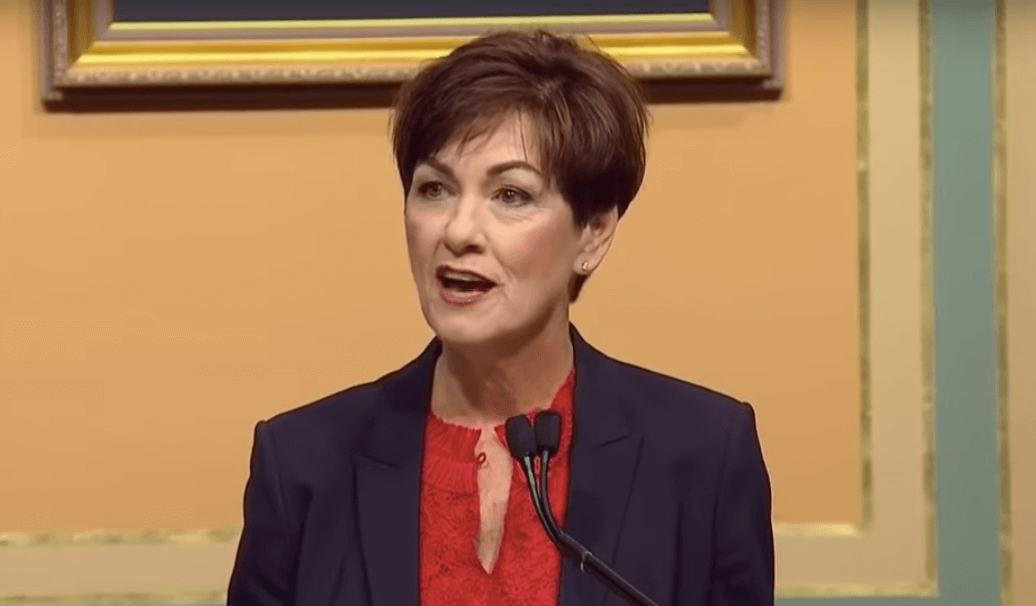
Democratic legislators and the public should be very suspicious of Governor Reynolds’ proposed constitutional amendment to restore former felons’ voting rights. There are several glaring reasons to distrust her proposal as simply a public relations stunt. She can claim she supports restoring former felons’ voting rights knowing that it’s likely to run into a buzz saw from Republican lawmakers.
The public must ask Reynolds why she publicly claims to believe in redemption but refuses to exercise her executive authority as Governor to automatically restore former felons’ voting rights.
“Let’s begin that process now. I believe Iowans recognize the power of redemption. Let’s put this issue in their hands,” said Reynolds.
Iowans put this issue in her hands when they elected her as their Governor. They gave her the power to restore former felons’ voting rights immediately and provide the redemption she says she values. She has the power to restore the rights of 52,000 former felons with the stroke of her pen.
Reporters questioned her about her choice to call for a constitutional amendment rather than using her executive power.
“I don’t believe restoration should be in the hands of a single person,” Reynolds answered.
Yet Reynolds has restored the voting rights of 88 former felons since taking office in May 2017. She was the single person that made that decision 88 times but now she says that restoration shouldn’t rest in the hands of a single person.
Instead, Reynolds has chosen to rely on a long and uncertain process of passing a constitutional amendment. That amendment can’t go into effect until 2022 at the earliest.
Both Governors Vilsack and Branstad exercised their gubernatorial powers on voting rights for felons. Governor Vilsack used his executive powers to restore the voting rights of 115,000 felons in 2005. Governor Branstad exercised his executive power as well in 2011, although he used it to reverse the Vilsack decision.
In Reynolds’ Condition of the State address she called restoring former felons’ voting rights as “the beauty of grace” and second chances.
There’s no question that Reynolds could issue an immediate executive order if she really is committed to grace and second chances. Is it possible that Reynolds knows this constitutional amendment has little chance of passing?
There is also a potent political motivation that no one is discussing, but is likely affecting Republicans’ decision making. Republicans believe former felons are more likely to vote for Democrats once their rights are restored. That belief is surely considered as they decide whether or not to support this initiative.
Several Republican lawmakers have threatened to either block the constitutional amendment or insert poison pill requirements that would weaken or defeat the restoration of full voting rights for former felons.
Senator Brad Zaun (R-Urbandale) and the powerful Chair of the Senate Judiciary Committee warned after Reynolds’ announcement that he was opposed to the amendment.
“My initial reaction is I’m resistant to changing the process in place,” Zaun said. He suggested it would run into a roadblock in his committee. “I know there’s going to be some resistance.”
Likewise, the House Judiciary Chairman Steve Holt (R-Denison) gave a hint at the poison pill requirement they might demand before a former felon could regain their right to vote. They could create a nearly impossible economic restitution goal for many low income former felons that would make it impossible for them to attain. Holt predicted restoration of voting rights would be contingent on, “Once they completely repay their debts to society.”
Representative Mary Wolfe (D-Clinton) a defense attorney has worked on this issue for a number of years.
“People who sometimes for no fault of their own are only making minimum wage … can’t ever pay their restitution,” Wolfe said. “Why should they be denied the right to vote if they’ve done everything else.”
This week Wolfe warned that the bill is in jeopardy. “I’m afraid they are going to shut it down because of Zaun,” Wolfe said.
The Governor’s refusal to use her executive power isn’t the only reason Democrats are skeptical of her commitment to restoring voting rights to felons. Currently, the system for individual felons to apply to the Governor for reinstatement of their voting rights is time consuming, costly and difficult.
The Brennan Center for Justice calls the Iowa application for restoration of former felons’ voter rights one of the “most onerous in the country.” The fact that Reynolds has only restored voting rights for 88 individuals out of 52,000 suggests the current system is systemically flawed.
The Governor controls the requirements for restoration. She could certainly make it easier and faster if she truly wanted to grant more felon restorations.
Meanwhile, the list of disenfranchised former felons will continue to grow the longer she delays action. In addition, a Des Moines Register investigation revealed that at least two dozen non-felon voters have been denied the right to vote because the current felony voting list is seriously inaccurate. By delaying, Reynolds is disenfranchising Iowa voters who have done nothing wrong.
If Governor Reynolds really wants to restore former felons’ voting rights, she should immediately sign an executive order and end the excuses.
by Rick Smith
Posted 2/27/19
Politics

Biden marks Earth Day by announcing $7 billion in solar grants
The Biden administration on Monday announced the recipients of its Solar For All Program, a $7 billion climate program that aims to lower energy...

6 terrifying things that could happen if the Comstock Act is used to target abortion
Does 1873 sound like a really, really long time ago? Well, that’s because it is—but if Republicans and far-right anti-abortion activists have their...
Local News

No more Kum & Go? New owner Maverik of Utah retiring famous brand
Will Kum & Go have come and gone by next year? One new report claims that's the plan by the store's new owners. The Iowa-based convenience store...

Here’s a recap of the biggest headlines Iowa celebs made In 2023
For these famous Iowans, 2023 was a year of controversy, career highlights, and full-circle moments. Here’s how 2023 went for the following Iowans:...





